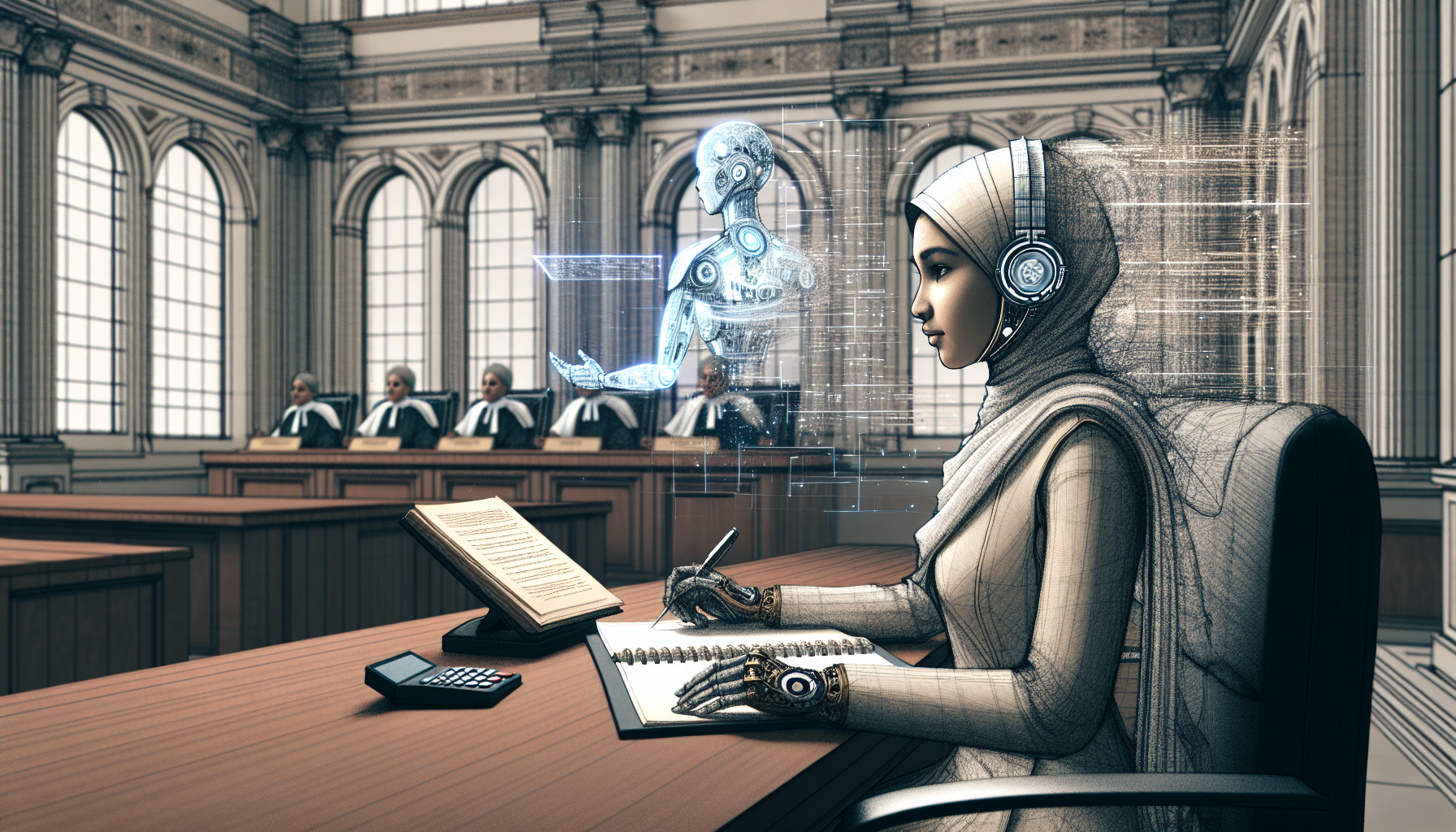
Revolutionizing Case File Management with ChatGPT
In the fast-paced world of criminal defense, managing case files efficiently is crucial. ChatGPT, an AI-based language model developed by OpenAI, is revolutionizing the way legal professionals handle case file management. By automating routine tasks, it allows attorneys and paralegals to focus more on case strategy and client interaction. The versatility of ChatGPT in handling data retrieval, document processing, and information dissemination makes it an indispensable tool in modern legal practice.
With ChatGPT, managing case files becomes not only more efficient but also significantly less labor-intensive. This technological innovation leads to enhanced productivity and reduced overhead costs, setting the stage for further integration of AI in legal services.
ChatGPT: The Modern Paralegal’s Best Friend
In every successful law firm, paralegals play a pivotal role in ensuring smooth operations. Enter ChatGPT, the tool that is rapidly becoming the modern paralegal’s best friend. ChatGPT can assist with various tasks like preparing legal documents, conducting preliminary research, and managing client databases.
For instance, when tasked with organizing vast amounts of case-related information, ChatGPT can systematically sort and store data, ensuring that everything is easily accessible. Additionally, it can generate quick responses to standard client queries, allowing paralegals to tackle more complex tasks without interruption.
Imagine a paralegal leveraging ChatGPT for standardized and customized document creation, essentially turning this AI tool into a reliable, always available assistant. This transformation not only optimizes workload distribution but also significantly boosts overall efficiency.
Also read:
Mastering Document Drafting: Advanced Prompts for Speed and Accuracy
Effective document drafting is essential in legal practice. ChatGPT can streamline this process through advanced prompting techniques, ensuring both speed and accuracy.
Standardizing Legal Documents
For routine documents like affidavits and motions, standardized prompts can save valuable time. Prompts such as, “Generate an affidavit template for a personal injury case,” can yield a well-structured, ready-to-use document.
Customizing Complex Filings
When it comes to more complex filings, personalized prompts are key. These prompts can consider specific case details, ensuring that every document is tailored to the unique needs of your case. For example: “Create a motion to dismiss for a criminal defense case involving evidence tampering.”
Formatting and Proofreading
Legal documents require impeccable formatting and zero errors. ChatGPT can assist by reformatting documents and conducting a comprehensive proofreading process. Simply input, “Proofread and format this plaintiff’s complaint to meet court standards,” and the AI will handle the laborious details.
This synergy of standardization and customization, coupled with impeccable formatting, enhances the accuracy and reliability of legal documents, making them court-ready in record time.
Also read:
Unleashing Research Superpowers: Streamlining Information Gathering
Accurate and exhaustive research is the backbone of strong legal arguments. ChatGPT can markedly streamline this crucial task.
Efficient Legal Research Techniques
ChatGPT can query vast databases to retrieve pertinent legal precedents, statutes, and regulations. Prompts like, “Find all relevant case law on evidence tampering in Louisiana,” can quickly yield vital information.
Summarizing Case Law and Statutes
ChatGPT can distill complex legal texts into digestible summaries, enabling faster assimilation of key points. For example, “Provide a summary of the landmark case XYZ vs. ABC and its implications on current laws.”
Overcoming Research Bottlenecks
Research often hits roadblocks due to voluminous data. ChatGPT can flag crucial information and eliminate irrelevant data, allowing for a focused research approach. Prompts like, “Highlight the key arguments in this 50-page judgment,” can vastly accelerate research timelines.
Utilizing ChatGPT for legal research not only saves time but also ensures comprehensiveness, thereby strengthening the legal arguments and strategies.
Also read:
Communication Streamlined: Enhancing Client and Team Interactions
Clear and precise communication is essential for effective legal representation, and ChatGPT offers robust solutions in this area.
Drafting Client Letters and Emails
Communicating with clients through well-drafted letters and emails enhances client satisfaction. ChatGPT can assist by generating professional correspondence swiftly. Prompts like, “Draft a client letter informing about next steps in their criminal case,” can produce comprehensive communication templates.
Internal Communication: Syncing with the Legal Team
Streamlining internal communication ensures that everyone in the legal team is on the same page. ChatGPT can generate meeting summaries and action items with prompts such as, “Summarize today’s team meeting concerning the pending trial briefs.”
Emphasizing Confidentiality and Accuracy
In legal communication, confidentiality and accuracy are paramount. ChatGPT adheres to strict data privacy protocols, ensuring that all generated content is secure. Specialized prompts like, “Generate a confidential email draft discussing case strategy for the defense team,” add layers of accuracy without compromising security.
These advanced communication capabilities of ChatGPT lead to better coordination, enhanced client relations, and streamlined team operations.
Also read:
Task Management Made Easy: Organizing Workflow and Calendar
Effective task management is critical for the seamless operation of legal practices. ChatGPT can simplify this by offering advanced organizational capabilities.
Efficient Task Prioritization Methods
Task overload is a common challenge. ChatGPT can help prioritize tasks based on deadlines and importance. Prompts like, “List tasks for the day and prioritize by urgency,” can yield a structured task list.
Scheduling and Deadline Tracking
Missing deadlines can be catastrophic in legal practice. ChatGPT can generate reminders and track key dates with prompts such as, “Set a reminder for filing the brief by 5 PM next Monday.”
Integrating with Existing Tools
ChatGPT easily integrates with existing task management and calendar tools like Microsoft Outlook or Google Calendar, enhancing your current systems.
Simple, yet powerful, these organizational features ensure that your legal practice remains on top of every deadline and task, culminating in higher efficiency and reduced stress.
Also read:
Ethical Considerations and Best Practices in Using AI
The integration of AI in legal practices does come with ethical considerations that must be addressed.
Confidentiality and data security are paramount. Always ensure that AI tools like ChatGPT comply with legal standards for data protection and privacy. Regularly update software and conduct audits to identify and mitigate potential risks.
Additionally, AI should augment, not replace, human expertise. Maintain a balanced approach where AI handles routine tasks, allowing legal professionals to focus on strategic decisions and human interaction.
Incorporating best practices will maximize the benefits of AI while safeguarding ethical and professional integrity in legal practice.
Also read:
Future Prospects: Expanding AI Capabilities in Criminal Defense
The future is bright for AI in criminal defense. With advancements in machine learning algorithms and data analytics, AI tools like ChatGPT are set to become even more sophisticated, assisting in predictive analysis and real-time legal strategy formulation.
As we move forward, continuous improvement in AI capabilities will further streamline legal processes, making justice more accessible and efficient.
Also read:
Maximizing Value: Tips and Tricks for Continuous Improvement
To maximize the value derived from ChatGPT, regularly update its database and fine-tune its prompts based on evolving legal standards and requirements. Engage in ongoing training programs to stay adept at utilizing AI tools effectively.
With these strategies, you can ensure continuous improvement, making AI an invaluable asset in your legal practice.


